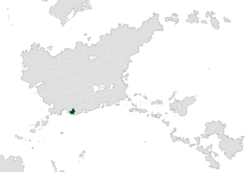Thouthen: Difference between revisions
No edit summary |
mNo edit summary |
||
| (One intermediate revision by the same user not shown) | |||
| Line 118: | Line 118: | ||
|footnotes = <!--For any generic non-numbered footnotes--> | |footnotes = <!--For any generic non-numbered footnotes--> | ||
}} | }} | ||
'''Thouthen''', officially the '''Democratic Republic of Free Thouthen''', is a sovereign state located in [[Musgorocia]]. It is bordered to the south by the Novarian Ocean, to the east by Côte d'Émeraude, and to the north and west by [[Bourgougia]]. It also shares a tiny, sub-kilometre border with the city-state of [[Victory (city-state)|Victory]]. With a land area of 19,538 square kilometres (7,544 sq mi) and an estimated population of 11,200,234, it is one of the smallest states in Musgorocia, albeit one of the most densely populated, with a population density of 573.3 people per square kilometre (1,484.8/sq mi). Since the Equalist Revolution of 2001, Thouthen has been governed as a unitary one-party state under a 'liberal progressive equalist' ideology. Led by Daniel Khassai Siyoum, who adopted the title Supreme Equaliser, the Revolution overthrew the internationally recognised, democratically elected government of Thouthen, and the Siyoum-led Democratic Socialist Party (DSP) immediately set about remaking all aspects of Thouthenese society, banning the practice of Christianity and installing the humanistic Gaia Hypothesis as the country's state religion. The country's capital, Benkenstein, was renamed Toleranzestaadt, with vast swathes of the city being demolished and | '''Thouthen''', officially the '''Democratic Republic of Free Thouthen''', is a sovereign state located in [[Musgorocia]]. It is bordered to the south by the Novarian Ocean, to the east by Côte d'Émeraude, and to the north and west by [[Bourgougia]]. It also shares a tiny, sub-kilometre border with the city-state of [[Victory (city-state)|Victory]]. With a land area of 19,538 square kilometres (7,544 sq mi) and an estimated population of 11,200,234, it is one of the smallest states in Musgorocia, albeit one of the most densely populated, with a population density of 573.3 people per square kilometre (1,484.8/sq mi). Since the Equalist Revolution of 2001, Thouthen has been governed as a unitary one-party state under a 'liberal progressive equalist' ideology. Led by Daniel Khassai Siyoum, who adopted the title Supreme Equaliser, the Revolution overthrew the internationally recognised, democratically elected government of Thouthen, and the Siyoum-led Democratic Socialist Party (DSP) immediately set about remaking all aspects of Thouthenese society, banning the practice of Christianity and installing the humanistic Gaia Hypothesis as the country's state religion. The country's capital, Benkenstein, was renamed Toleranzestaadt, with vast swathes of the city being demolished and rebuilt according to equalist tastes. | ||
As with other countries in Musgorocia, modern day Thouthen was settled in the 1500s by Eulabian colonialists. Initially a French-speaking territory, it came under Dutch control in the late 1600s. Following the Musgorocian wars of independence in the 1820s and 30s, Thouthen became independent as a democratic | As with other countries in Musgorocia, modern day Thouthen was settled in the 1500s by Eulabian colonialists. Initially a French-speaking territory, it came under Dutch control in the late 1600s. Following the Musgorocian wars of independence in the 1820s and 30s, Thouthen became independent as a democratic republic. From that point it was one of the most prosperous countries on the continent, benefitting from Benkenstein's position as a major financial centre and hub of international trade. In 1945, immediately prior to the [[Emergency War]], Synarchist Bourgougia invaded and annexed Thouthen under the pretext that it was historically part of colonial Bourgougia. Occupied throughout the entirety of the war, Benkenstein was spared from significant destruction, and the country quickly rebuilt following Bourgougia's defeat. Starting in the 1960s, the adoption of an open borders policy towards immigration from Afruika and Hasua caused the country's immigrant population to swell to an unprecedented degree. Coupled with the destablising Bourgougian Civil War and proliferation of firearms, tensions between Thouthen's resident population and immigrants boiled over in 2001 after the 2000 general election, ultimately resulting in the Equalist Revolution and the overthrow of the Republic. | ||
According to a 2023 study, approximately 60% of Thouthenese residents have either not been born in the country, or have at least one parent not born in Musgorocia. Siyoum's regime has received little recognition from the international community, including none from the five permanent members of the [[ISAAC|International Security and Arbitration Council]]'s (ISAAC) Security Committee. Consequently, these countries have regarded declarations by Siyoum to have withdrawn Thouthen from regional institutions such as the [[Musgorocian Criminal Court]] (MCC) as invalid. Beginning in mid-2024, and facing bankruptcy due to extraordinary levels of national debt caused by excessive spending on social welfare programmes and the military, Siyoum ordered the beginning of a genocide against the country's minority white Christian population, resulting in the [[Thouthen crisis]]. | According to a 2023 study, approximately 60% of Thouthenese residents have either not been born in the country, or have at least one parent not born in Musgorocia. Siyoum's regime has received little recognition from the international community, including none from the five permanent members of the [[ISAAC|International Security and Arbitration Council]]'s (ISAAC) Security Committee. Consequently, these countries have regarded declarations by Siyoum to have withdrawn Thouthen from regional institutions such as the [[Musgorocian Criminal Court]] (MCC) as invalid. Beginning in mid-2024, and facing bankruptcy due to extraordinary levels of national debt caused by excessive spending on social welfare programmes and the military, Siyoum ordered the beginning of a genocide against the country's minority white Christian population, resulting in the [[Thouthen crisis]]. | ||
Latest revision as of 07:39, 13 September 2024
Democratic Republic of Free Thouthen | |
|---|---|
|
Flag | |
 Location of Thouthen (dark green) in Musgorocia (grey) – [Legend] | |
| Status | ISAAC member state under a partially recognised government |
| Capital and largest city | Toleranzestaadt |
| Official languages | Dutch |
| Ethnic groups | |
| Demonym(s) | Thouthenese |
| Government | Unitary one-party equalist state under a totalitarian dictatorship |
• Supreme Equaliser | Daniel Khassai Siyoum |
| Population | |
• 2022 census | 11,200,234 |
• Density | 573.3/km2 (1,484.8/sq mi) |
| Currency | Thouthenese credit (T₡) |
| Date format | dd/mm/yyyy (CE) |
| Driving side | right |
Thouthen, officially the Democratic Republic of Free Thouthen, is a sovereign state located in Musgorocia. It is bordered to the south by the Novarian Ocean, to the east by Côte d'Émeraude, and to the north and west by Bourgougia. It also shares a tiny, sub-kilometre border with the city-state of Victory. With a land area of 19,538 square kilometres (7,544 sq mi) and an estimated population of 11,200,234, it is one of the smallest states in Musgorocia, albeit one of the most densely populated, with a population density of 573.3 people per square kilometre (1,484.8/sq mi). Since the Equalist Revolution of 2001, Thouthen has been governed as a unitary one-party state under a 'liberal progressive equalist' ideology. Led by Daniel Khassai Siyoum, who adopted the title Supreme Equaliser, the Revolution overthrew the internationally recognised, democratically elected government of Thouthen, and the Siyoum-led Democratic Socialist Party (DSP) immediately set about remaking all aspects of Thouthenese society, banning the practice of Christianity and installing the humanistic Gaia Hypothesis as the country's state religion. The country's capital, Benkenstein, was renamed Toleranzestaadt, with vast swathes of the city being demolished and rebuilt according to equalist tastes.
As with other countries in Musgorocia, modern day Thouthen was settled in the 1500s by Eulabian colonialists. Initially a French-speaking territory, it came under Dutch control in the late 1600s. Following the Musgorocian wars of independence in the 1820s and 30s, Thouthen became independent as a democratic republic. From that point it was one of the most prosperous countries on the continent, benefitting from Benkenstein's position as a major financial centre and hub of international trade. In 1945, immediately prior to the Emergency War, Synarchist Bourgougia invaded and annexed Thouthen under the pretext that it was historically part of colonial Bourgougia. Occupied throughout the entirety of the war, Benkenstein was spared from significant destruction, and the country quickly rebuilt following Bourgougia's defeat. Starting in the 1960s, the adoption of an open borders policy towards immigration from Afruika and Hasua caused the country's immigrant population to swell to an unprecedented degree. Coupled with the destablising Bourgougian Civil War and proliferation of firearms, tensions between Thouthen's resident population and immigrants boiled over in 2001 after the 2000 general election, ultimately resulting in the Equalist Revolution and the overthrow of the Republic.
According to a 2023 study, approximately 60% of Thouthenese residents have either not been born in the country, or have at least one parent not born in Musgorocia. Siyoum's regime has received little recognition from the international community, including none from the five permanent members of the International Security and Arbitration Council's (ISAAC) Security Committee. Consequently, these countries have regarded declarations by Siyoum to have withdrawn Thouthen from regional institutions such as the Musgorocian Criminal Court (MCC) as invalid. Beginning in mid-2024, and facing bankruptcy due to extraordinary levels of national debt caused by excessive spending on social welfare programmes and the military, Siyoum ordered the beginning of a genocide against the country's minority white Christian population, resulting in the Thouthen crisis.

